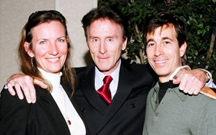|
|
|
The Evolution of A Health Movement from Counter Culture to Mainstream 
A Visit with Gary Null, PhD.
The natural health industry has come a long way. Forty years ago nutritional supplements, health foods, juicing, meditation and yoga were just for those “earthy types," "hippies" or "free spirits."
Now, everyone from the local bus driver to the high profile attorney are taking their vitamins, slugging down shots of wheat grass juice and packing yoga studios. There are some obvious reasons for the exponential growth of the industry: a growing population of baby boomers determined to take control of their health, tastier healthy food options, health conscious consumers who demand more choices, an economic power base to afford a healthy lifestyle and of course, the Internet which provides the average consumer with enough health information for several lifetimes. But there's another factor in this equation—one which has cultivated and grown the alternative health industry for several decades, estimated at bringing in over $7 billion a year into the industry and promoting health to over 30 million people annually. What or better yet, who, is this factor? For the past 40 years, natural foods industry pioneer, Gary Null, PhD., has been the only natural health advocate in the media with a consistent public forum, promoting healthy lifestyles through vegetarianism, juicing, supplements, exercise, psycho-immunology, mind/body integration and empowerment.
The Gary Null Show, the longest running (30 years) health radio show in America, reaches about 8 million people per month via the Internet. In addition, Gary has created nearly 20 alternative health, PBS television specials and lectures worldwide to overflow audiences. His New York Times best-selling books and countless published articles have enriched the lives of millions more, and yet remarkably, he has sought no personal publicity or endorsements for his efforts. "When people see me on TV, listen to my radio show, attend a lecture or read one of my books or articles and become inspired to take action to make a positive change, it makes it all worth it--knowing that I am able to help people take control of their health and lives every day," Null said.
Throughout his numerous videos on human development, Gary emphasizes the importance of the synergistic relationship between health and empowerment. “The one thing that we have learned is that change requires a two step approach, not just being exposed to quality information, but also having the power to surrender and break old habits which is crucial to making positive change. Without that power, all of the good input in the world will not make a difference and it will stay unused.”
Having opened the first food co-op in New York in 1965, as well as the first gourmet vegetarian restaurant in America in 1970, Gary knows the psychology of the industry inside out: “Healthy products and concepts won't sell themselves. It takes a great deal of effort over a sufficient period of time before people will embrace these things, so there must be a sustaining influence. People are creatures of habit and comfort, so creating change must be continually reinforced. It can be something as simple as giving up coffee and replacing it with herbal tea or having a protein shake instead of bacon and eggs for breakfast. Or even just having an awareness of the electromagnetic dangers of cell phones. But whatever their motivation is, it might take several years for someone to actually implement a change and still, it doesn't mean that they'll change everything. Most change is made begrudgingly and defiantly, so generally, most people need to change in small steps and not quantum leaps. The approach must be filled with compassion and sensitivity, not arrogance and stridency. Many people in the health movement have so isolated and alienated the mainstream because of their almost militant attitude. Inspiring others to make positive change requires being a constant diplomat.”
Gary “walks his talk,” a convincing example of the benefits of a healthy lifestyle. A strict vegan, avid athlete and model of success and empowerment, Null consumes only unprocessed, organic foods and fresh vegetable and fruit juices. He also utilizes a wide array of nutritional supplements and holistic modalities. He exercises intensely six days per week both aerobically and anerobically, meditates, connects with nature, and strives to honor the mind, body and spirit. A master chef, Null also treats himself and those around him to healthy, delicious dishes through the thousands of food and juice recipes he has created.
Looking ahead to the future of the industry, Null notes that the current momentum towards organic produce being carried by major retailers like Wal-Mart and the spreading of certain mainstream, chain health food stores will have limited sustainability. According to Null, without the proper advocates and educators, the movement will slow, as there are too many bad choices all around us. Null believes there needs to be people and foundations to support research, and educational forums to compete for people's time. According to Null, “most people are coming into the health movement just to make money or a name for themselves. Instead, the public needs a group of younger more idealistic people whose goal is to truly help others achieve healthier lifestyles and see their changes as real. No one is going to learn health consciousness from Wal-Mart.”
Null believes that the next forty years will be even more challenging than the last forty. The entrepreneurs who created many of the popular brands of health items today are all gone and have been replaced with a purely corporate entity. “Unfortunately,” says Null, “a higher consciousness does not come through a purely corporate entity, as it lacks the nuance of human nature trying to facilitate authentic change, hence all the more reason for people to look to documentaries, PBS
television and non-commercial radio as the vehicles to offer some counter balancing, insight and inspiration to the future of the health movement.”
|

